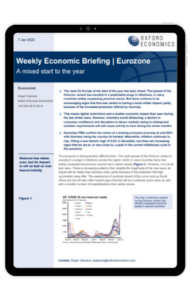Eurozone weekly economic briefing – A mixed start to the year

The news for Europe at the start of the year has been mixed. The spread of the Omicron variant has resulted in a predictable surge in infections, in many countries widely surpassing previous waves.
What you will learn:
- There are encouraging signs that this new variant is having a much milder impact, partly because of the increased protection offered by vaccines.
- This means lighter restrictions and a smaller economic impact than seen during the last winter wave.
- December PMIs confirm the notion of a slowing eurozone economy at end-2021, with Germany being the country hit hardest.
Tags:
Related research

Post
Nowcast shows wage growth slowing sharply
Our sentiment data, developed with Penta, suggests that UK private sector wage growth slowed sharply in March and early-April. If official data mirrors our sentiment indicator, it should keep the Monetary Policy Committee on track to cut interest rates in the summer.
Find Out More
Post
The euro and depreciation – shake, shake it off
Our new forecast assumes a slower euro appreciation against the dollar over the coming years than we previously anticipated. Relative productivity, terms of trade, and the current account will likely be less supportive of the euro than we thought. In addition, a stronger stock market than initially envisaged will attract more financial flows into the US than we had expected.
Find Out More